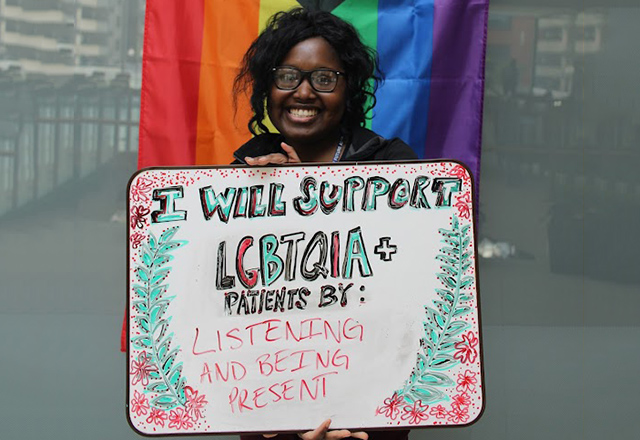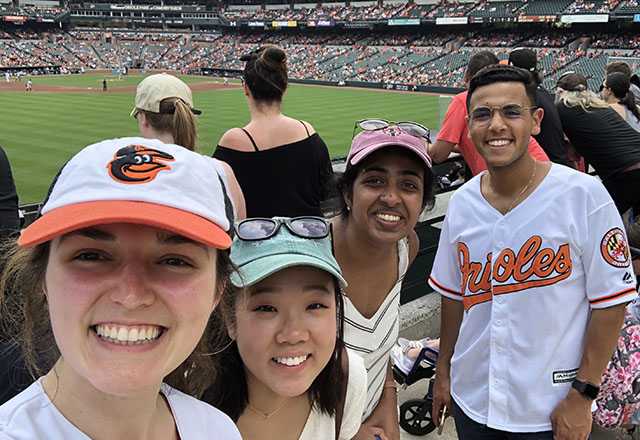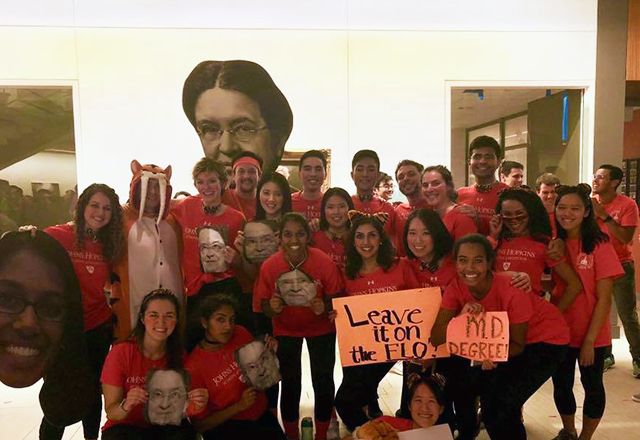Prerequisites, Requirements and Policies
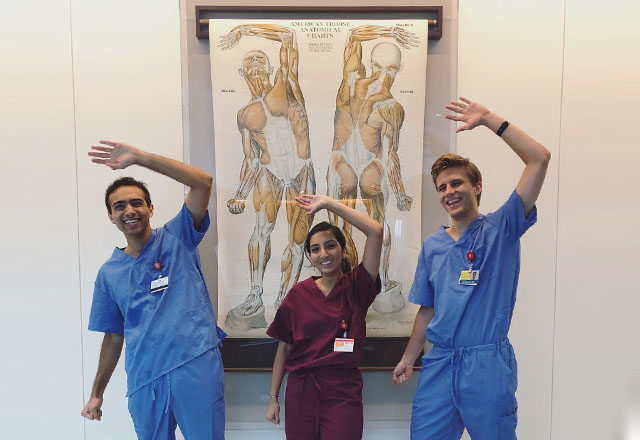
Online Courses
As a result of the COVID-19 pandemic, the School of Medicine has changed its policy regarding prerequisite courses taken online. We will now accept online prerequisite courses completed at an accredited college or university, whether these were taken prior to the pandemic or any time afterward.
Medical school studies build on a strong foundation in the sciences and mathematics at the premedical level. Beyond the successful fulfillment of these basic prerequisites, the Committee on Admission considers the overall quality and scope of an applicant’s undergraduate educational experience. The field of concentration for undergraduate studies and the selection of additional science and mathematics courses are the student’s personal choice and will not affect the admission process.
In addition to the academic requirements detailed below, we seek candidates who evidence the following characteristics:
- Academic Excellence
- Leadership
- Service, compassion and humanism
- Diversity
- Ability to work in a team (or as part of a team)
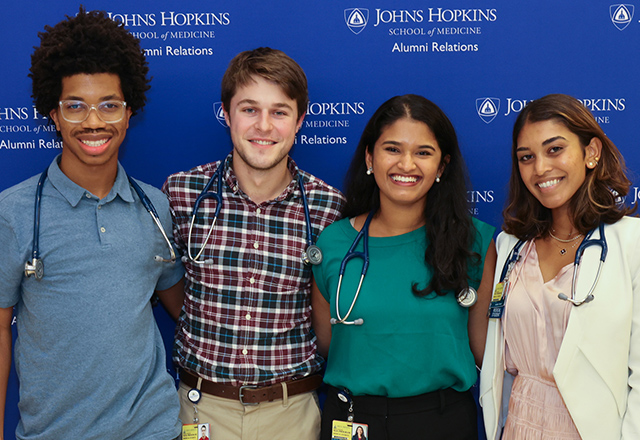
Requirements for Admission
State Authorization Disclosure Regarding Educational Prerequisites (PDF)
The following general requirements must be met by all applicants:
I. Standardized testing.
The Medical College Admissions Test (MCAT) is required for acceptance. The MCAT must be taken no later than September in the year the application is submitted. The oldest MCAT considered will be four years prior to date of expected matriculation. For students entering in Fall 2026, the oldest acceptable MCAT is October 1, 2022.
Note for graduates of foreign institutions: Successful passage of the TOEFL examination is required for all students whose undergraduate instruction was conducted primarily in a language other than English.
II. Required academic work from an accredited institution
(As listed on “Accredited Institutions of Postsecondary Education,’’ authorized and published by the American Council on Education, One DuPont Circle NW, Washington, D.C. 20036.)
JHUSOM accepts prerequisites completed at the community college level. In order to be competitive in the selection process, we encourage prospective applicants with community college prerequisites to supplement these courses by taking advanced courses in related subjects at their four-year institution. A holistic review process is used to select applicants to interview at Johns Hopkins, and many factors are considered in this review. These factors include the rigor of the applicant’s course of studies, grades, MCAT scores, clinical and research exposure, letters of recommendation, personal statement and the applicant’s understanding of medicine. In addition, we consider the path the applicants have taken that led to their desire to apply to medical school and become a physician.
Advanced Placement (AP) and International Baccalaureate (IB) credits acceptable to the student’s undergraduate college may be used to satisfy the prerequisites in biology, chemistry, physics, calculus/statistics and up to one-half of the humanities/social, behavioral sciences. AP and IB credits must be documented on an official transcript.
Please note the additional requirements for biology and chemistry listed below.
- Extension or evening courses taken in fulfillment of premedical course requirements are not acceptable unless they are identical to courses offered in the college’s regular academic program.
- Preparation in foreign universities must be supplemented by a year or more of work at an accredited university in the United States. Please note that this is not a requirement for applicants whose bachelor's degree was received in Canada.
- Prerequisites do not need to be completed to apply but must be completed by August 1, just prior to matriculating at Johns Hopkins. Until successful completion of the requirements, acceptance is considered conditional.
- All coursework submitted in fulfillment of admission requirements must be evaluated on the basis of a traditional grading system. Such a system must employ a range of numbers or letters to indicate the comparative level of performance.
- CLEP credits may not be substituted for any course requirement.
Specific premedical course requirements are:
-
College biology with laboratory, one year (8 semester hours).
A separate course devoted to the principles of genetics (4 sem. hours) is recommended. Individuals who have not completed their studies in biology within the past four (4) years are strongly encouraged to take an additional course in mammalian or molecular biology. If using AP or IB credit, an additional semester in advanced biology, such as cell biology, genetics, physiology, molecular biology, etc., is required.
-
i. General college chemistry with laboratory, one year (8 semester hours).
If using AP or IB credit, an additional semester in advanced chemistry is required. Acceptable advanced chemistry courses include the following: a second semester of organic chemistry; a second semester of biochemistry; analytical chemistry (quantitative or qualitative); physical chemistry, applied chemical equilibrium and reactivity, etc.
ii. Organic chemistry with laboratory, one semester (4 semester hours) are required.
iii. Biochemistry. Minimum of 3 semester hours. Lab is not required.
The student should have knowledge of chemical equilibrium and thermodynamics, acid/base chemistry, the nature of ions in solution and redox reactions, the structure of molecules with special emphasis on bio-organic compounds, reaction rates, binding coefficients, reaction mechanisms involved in enzyme kinetics and other applications to the understanding of living systems. Also important is a basic understanding of the structure of nucleic acids, including how they store and transfer information.
-
The study of the humanities and social and behavioral sciences is an essential foundation for the study and practice of medicine. These disciplines foster a broad understanding of humankind and the increasingly diverse cultural and social environment of our world. A minimum of 24 semester hours is required in areas of humanities (English, History, Classics, Foreign Language, Philosophy, Arts, etc), social science (Sociology, Economics, Political Science, Anthropology, etc.) and behavioral science (Psychology, etc.). Candidates must be proficient in spoken and written English. Required course work will include at least two writing-intensive courses which can be in the humanities or the social/behavioral sciences and may be counted as part of the twenty-four (24) semester hour requirement for the humanities/social sciences. AP or IB credit acceptable to the student's undergraduate college is allowed for a maximum of twelve (12) credits. Please see Communication Skills under Additional Requirements below.
-
Calculus and/or Statistics Minimum of 6 semester hours.
Mathematics courses should enable the student to develop equations, to interpret graphical representations of function and to evaluate probability involved in testing hypotheses in the study of natural phenomena. AP or IB credit for calculus or statistics, if acceptable to the student’s undergraduate college, may be used in the fulfillment of the math requirement. Regardless of such credit, it is strongly recommended that applicants take at least one semester of statistics or epidemiology.
-
General college physics with laboratory, one year (8 semester hours).
The student should have an understanding of the constants and units of physical measurement, Newtonian mechanics, the physical properties of various states of matter, such as liquids, solids and gasses, and the basic aspects of electricity, magnetism and optics, and their applications to living systems. AP or IB credit for physics, if acceptable to the student’s undergraduate college, may be used in fulfillment of the physics requirement.
The laboratory portion of this requirement is expected to equip the student with practical understanding of the process of scientific inquiry and to gain insight into how scientific knowledge is discovered and validated.
III. A Bachelor of Science (B.S.) or Bachelor of Arts (B.A.) degree from an accredited institution.
Additional Requirements
I. Communication skills
Required course work will include at least two writing-intensive courses, which can be in the humanities or the social/behavioral sciences and may be counted as part of the 24-semester hour requirement for the humanities and social sciences. It is expected that the student will have demonstrated precise and fluent communication in spoken and written English. It is strongly recommended that the student achieve basic conversational skills in a foreign language.
II. Teamwork skills
Medicine is a strongly collaborative endeavor. The applicant must demonstrate the ability to work successfully with others toward a common goal. A significant experience requiring teamwork is therefore expected in the course of the applicant’s academic and/or extracurricular activities and should be documented in the application.
III. Conditions of admission
Students admitted to the School of Medicine on a conditional basis (i.e., requirement(s) yet to be completed) must fulfill those conditions prior to matriculation in the school of medicine.
IV. Letters of recommendation:
- Committee letter (required if your college/university has an officially designated committee or advisor). Authored by a pre-health committee or adviser and intended to represent your institution's evaluation of you. A committee letter may or may not include additional letters written in support of your application; - OR -
- Letter packet: A packet or set of letters assembled and distributed by your institution, often by the institution's career center. - OR -
- Two (2) letters from faculty members in science departments who taught you are required if the college/university you have attended does not have a Committee/Advisor AND one (1) letter from a non-science faculty member who has taught you. In addition to the letters, applicants with advanced degrees or significant postgraduate work experience of one year or more, are required to send recommendations from each component of their education and major work experience.
In addition to those letters required for application to the M.D. program, two additional letters of recommendation are required for all M.D.-Ph.D. applicants. These letters are typically from faculty with whom the applicant has done research.
V. Non-U.S. citizen applicants
Official transcripts are required from all colleges attended outside the United States and Canada for matriculating students.
VI. Application Review
Following receipt of all required credentials, the Committee on Admission will review applications and make interview decisions. Applicants selected for interview will be notified by the committee. All interviews are conducted virtually. Notification of acceptances will be made in mid-March. Notification of acceptances are made between late fall and mid spring.
Policies
Visiting Students
The Johns Hopkins University School of Medicine has limited availability for students at other medical schools to participate in rotations.
Transfer Students
Due to the intensity and integration of our four-year curriculum, the Johns Hopkins University School of Medicine is unable to accept transfer students.
Deferrals
Admitted students may request to defer their matriculation by April 15. The Deferral Committee will consider requests individually and will typically grant deferrals for research, academic programs (graduate studies, scholarship) or service programs. Deferrals are usually allowed for one or two years.
Technical Standards
Please review the updated technical standards.
Contact Us
For additional information, applicants should contact somadmiss@jhmi.edu.

